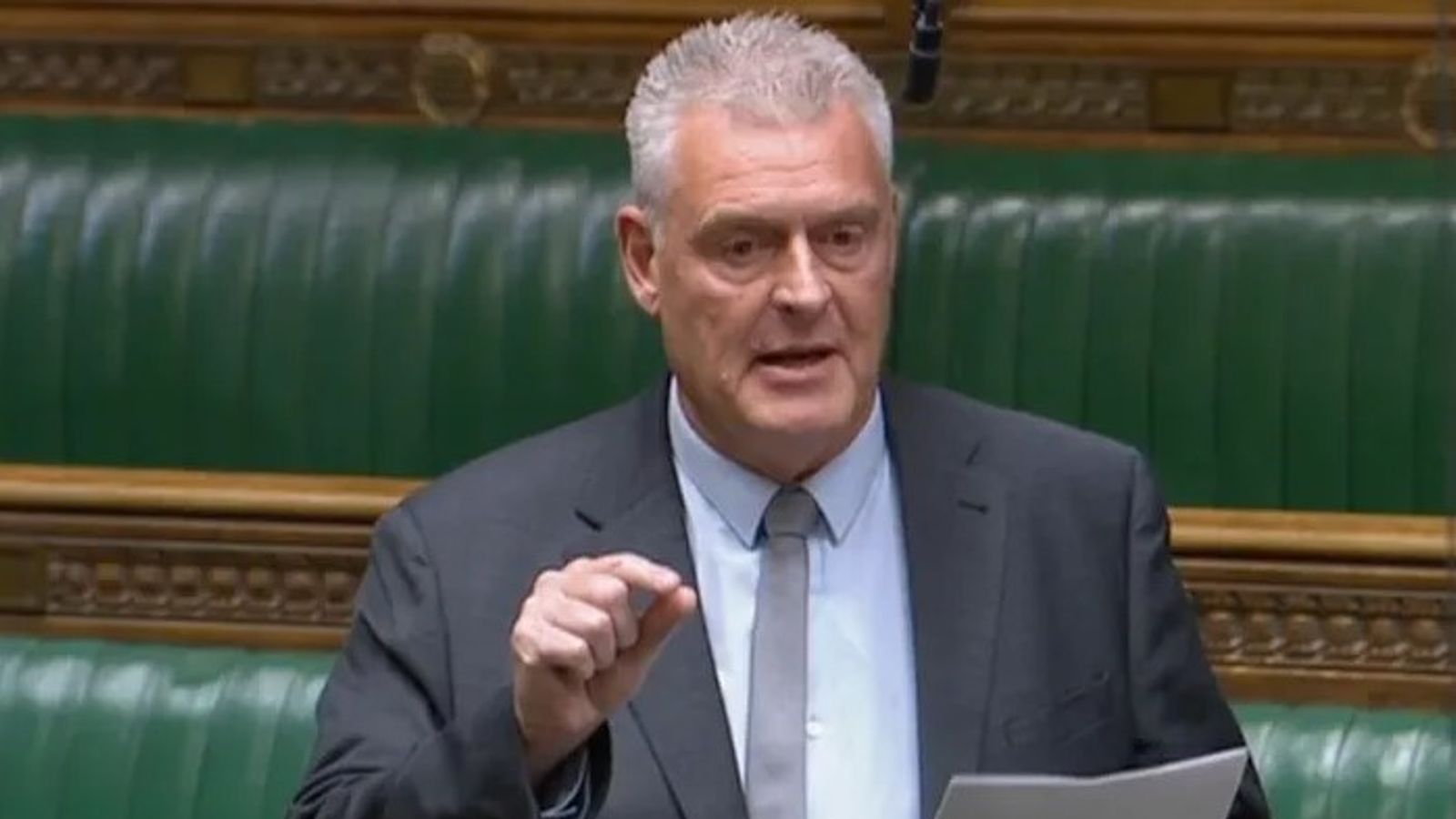Deputy chairman of the Conservative Party Lee Anderson has said it is a “myth” that people on Universal Credit are in poverty.
Leading a debate in Westminster Hall on the cost of food, the Ashfield MP dismissed calls for free school meals to be extended to all children in households receiving the benefit.
While providing no evidence to support his claims, he said some had “household incomes of over £40,000 a year” and “loopholes” in London allowed them to “top their wages up” by a further £30,000.
“There is this myth in this country that, if people are on Universal Credit in this country, they are in poverty,” he said. “And I dispel that myth right now.”
Politics live: Starmer and Sunak clash over cost of living crisis
Sky News has contacted the Department for Work and Pensions to check the veracity of his claims.
However, the standard allowance for households is £334.91 a month for single claimants aged 25 or over, or £525.72 a month for joint claimants with either aged 25 or over.
Lee Anderson: Tory deputy chairman to be sued over ‘defamatory bribery claims’, law firm says
Claimants can also access additional allowances, including for childcare and housing costs.
But the amount a household receives is reduced by 55p for every £1 earned above a defined work allowance.
In 2020/21, around one in five people in the UK were considered to be in poverty – 13.4 million people, the Joseph Rowntree Foundation estimated.
Government figures show the number of people on Universal Credit was 5.6 million on 13 January 2022.
‘Too easy’ to blame cost of living crisis
In a wide-ranging speech, Mr Anderson also claimed foodbanks were being “abused” by people who did not need them, and that there was a “culture” of them being used as “a weekly shop” by some.
“I had one particular family I was helping… they were going to a foodbank two or three times a week to get their groceries and then I see them in McDonalds two or three times a week,” he claimed.
“It is all about priorities. If you are really struggling for money and you are going to a foodbank two or three times a week, you shouldn’t be going out for fast food takeaways every week. You shouldn’t be doing that.”
The Tory MP, known for his outspoken views on food poverty, also criticised a school that had been running a breakfast club for all its pupils, which ended after it ran out of private funding.
“I asked why are some families are unable to feed their children at breakfast – why can’t they give them a slice of toast or whatever?” he said.
“They struggled to answer me. They eventually said, ‘well it’s the cost of living crisis isn’t it?’.
“And I thought, well, Weetabix and a bowl of milk, what does that cost? It isn’t even the 30p that I am famous for. It probably costs a lot less than that.”
Mr Anderson said he asked to meet the parents who were struggling, to “see where they were going wrong, if they had debt problems, budgeting problems, social problems”, but had not had a reply.
“And why have I got nothing back?” her added. “I’ll tell you why… because there is a reluctance in certain parts of this country now to get to the root of this problem.
“It is far too easy to say there is a cost of living crisis. Yes we know people are struggling, we know food prices are up, we know energy prices are up we know all this, but you can’t keep throwing tax-payers’ money [at the problem].”
Please use Chrome browser for a more accessible video player
The deputy chairman said there had not been a “proper culture in this country for decades about personal responsibility of feeding ourselves”.
He added that people should “remind ourselves where we come from, those traditional values that our parents have, that we used to have”, especially when it came to growing our own food.
“My mum and dad really struggled,” he said. “I come from poverty… but my dad had a garden.
“My dad was a coal miner who worked 7 days a week, my mother was a factory worker. At the weekend, my dad did his garden and we had vegetables in their top to bottom, and in the bottom we had chickens and rabbits and ducks.
“That was our food bank, we had nowhere else to go, we provided for ourselves.”







